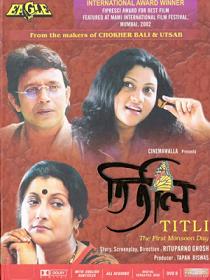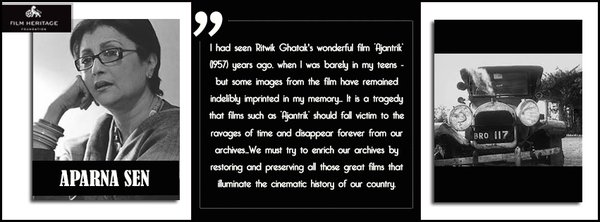Mrinal Sen made Akash Kusum (Up in the clouds) in 1965. Akash Kusum was on the longings of a middle class executive to rise in stature and greater social acceptability. Soumitro Chaterji played the central role in this movie. Aparna Sen, Subhendu Chaterji, Jnanesh Mukherji, Sova Sen, Haradhan Banerji were the other performers. This had a rather straight-forward story with not much thematic novelty, but contained experiments with cinematic techniques like ‘Jump Cuts.’ It spawned a Hindi remake made by Basu Chaterji called MANZIL featuring Amitabh Bachchan (with slight alterations). The review of the film sparked a long running debate between Mrinal Sen and Satyajit Ray, which was prominently featured in a leading newspaper published from Calcutta.

The story: Soumitro, a middle class executive, falls for Aparna Sen. Soumitro’s friend ( Subhendu Chaterji ) owns a good flat in Calcutta and Soumitro makes use of most of his friend’s possessions – telephones, cars and the flat itself. Soumitro introduces himself as the owner of the house of Subhendu to Aparna, and also makes the mistake of inviting Aparna Sen’s parents (Haradhan Banerji and Sova Sen) to the house. Certain scenes remains etched in memory. When Soumitro goes to a saree shop with Aparna Sen, and says that he has forgotten his wallet back in the office, rings back and starts blabbering something with no one at the other end of the phone – it was a hilarious sequence.
Soon Subhendu Chaterji’s mother comes to Calcutta to stay with her son. Another hilarious sequence was when Soumitro receives a phone call from Aparna in front of Subhendu and his mother and tries to evade Aparna on the phone with some lame excuses (such as ‘he has come to attend the phone while he was shaving, and which i.e shaving is now half done’).
Soon Soumitro’s lies get exposed. One day, Haradhan Banerji, father of Aparna comes to Subhendu’s house (which Soumitro has claimed as his own) and meets Subhendu’s mother. She tells Haradhan that Soumitro is the bosom friend of her son (Subhendu) and comes there everyday, and that Soumitro actually stays elsewhere. Haradhan returns home and tells Aparna that Soumitro is an imposter – a cheat. When Soumitro comes to meet Aparna at her residence, Haradhan commands Soumitro to leave the house and never try to meet Aparna again.
The last scene was quite memorable. Soumitro is seen leaving the house as Haradhan commanded, while at the gate he looks back and sees Aparna on the window, and soon both starts waving at each other, knowing that the curtain is falling on their relationship .
In Akash Kusum, Mrinal Sen used jump cuts and freeze shots a la Godard, and he was promptly accused of gimmickry.
Mrinal has often been seen to be somewhat critical of Indian film reviewers. It started from Akash Kusum. Sen has always made economical usages of still photographs in his films. In Akash Kusum in a situation where Soumitro realizes that all his efforts are in vain, at that moment Sen makes use of a still photograph. When darkness slowly fades in Gyanesh Mukhopadhay says ” He he he he … aaro kichu taka chai je sir.” (with a mischievous laughter, Gyanesh Mukherjee demanded more money) To depict such a cruel situation aptly, Sen was able to arrive with minimal cost and this he considers an achievement. He could not have depicted it in any other way. Reviewing this sequence and the film as a whole, the reviewer of the Bengali daily Anandabazar Patrika commented that “This is not a moving film. This is a still film.” Proves that a little deviation from set norms in Indian film making is bound to bring criticism to its maker.
Mrinal Sen introduced Subhendu Chaterji in this film. AKASH KUSUM was based on a story by Ashish Burman. Music was scored by Sudhin Dasgupta.
In the romantic world of Mrinal Sen – Baisey Shravan, Akash Kusum, Khandahar and Mahaprithibi (with the notable exception of Amar Bhuban) a happy ending doesn’t greet the viewers. Even in the non romantic man-woman relationship (Neel Akaser Neechey, Bhuvan Shome, Antareen) the warmth is short-lived. Love doesn’t manage to trump the counter currents and triumph at the end.
Rating: 3.8 out of 5









